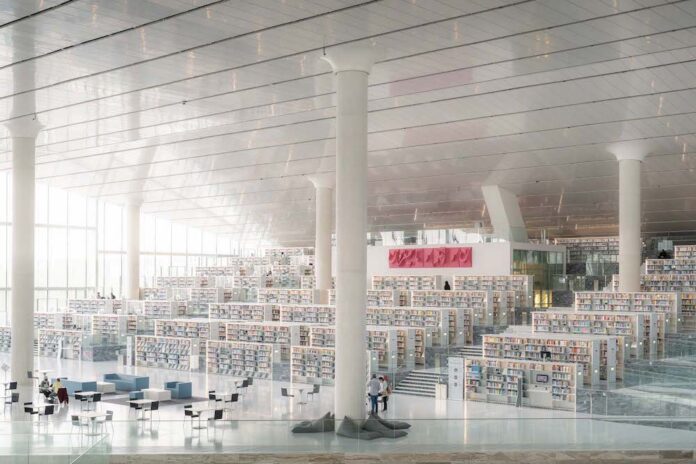Prophets and knowledge are not a bad legacy
Vodafone Qatar (VQ) has won accolades for its skilful and creative use of 5G connectivity to find personal fulfilment during the holy month of Ramadan. Through its cultural sensitivity it has helped devotees stay connected with friends and family, and enjoy a healthy and active lifestyle during the sacred festival, according to regional news outlet Gulf Times. The newspaper said the Al Bayt Al 3oud series of TV adverts struck a chord with the populace and this exemplified how religion, art and commerce need not be mutually exclusive. It also serves to remind that knowledge in Qatar’s libraries (pictured) and the stories kept alive by prophets are not a bad legacy.
The modernity and sophistication of VQ’s content created an unprecedented level of spirituality for the medium of mobile content, by its imaginative setting of a Ramadan-themed sitcom, featuring guest stars Mohamed Saadon al-Kuwari and Majed al-Mansoori. In the story, Vodafone’s 5G technology offers an instant solution to a struggling central character during a game of Padel by easing his worries and restoring his confidence with the help of its unlimited volumes of data delivered a high velocity and unshakeable veracity. Is there an obvious metaphor here, between the strong mobile network and an unshakeable moral framework that faith can bestow?
Vodafone Qatar was named as the World’s Fastest Mobile Network by testing company Ookla. It has led 5G deployment in Qatar since 2019 under its commitment to consumer connectivity to consumers and business continuity. In the last four years the mobile operator’s 5G offerings, through packages like Unlimited 300, Unlimited 375 and Unlimited VIP, all share the same core of unlimited local calls and SMS, data roaming across 155 countries and 500 international minutes.
Vodafone Qatar launched the five-episode series ‘Al Bayt Al 3oud,’ translated as ‘The Big House,’ earlier in Ramadan to demonstrate the pivotal role of technology in uniting family, celebrating tradition, and building community. The series was created by Qatari filmmaker Hamida Issa who invented creative new experiences through connecting with different members of a family, bringing his message across through relatable stories as they tackle various conflicts in Ramadan.
VQ’s plan is to invest and develop its 5G products to help the people make a well planned ‘digital transformation journey’ where much thought has gone into the cultural experience of the destination. The new online world is an environment that fosters not just a digitally-connected Qatari society, but an culturally advanced one, according to Vodafone Qatar chief operating officer Diego Camberos. To see how VQ pulled this off, search your social media channels for the weekly episodes of #AlBaytAl3oud or see Vodafone Qatar’s Ramadan campaign.
The knock-on effect is that VQ has inspired the creation of many connected cultural initiatives, with an imagination that is sometimes lacking in other major religions. This Ramadan, Qatar Foundation (QF) is screening a series of special episodes of
its 3D edutainment TV series, that are religiously significant and offer an engaging way for children to learn Islamic values and morals, Gulf Times reports. Now that technology is a dominant our lives, it is essential to have educational programmes like Siraj for children, according to Sulaiman Timbo Bah, community engagement and outreach co-ordinator at Minaretein Centre.
These keep the culture of each community alive, rather than lowering the ‘digital generation’ into morality free abyss of Silicon Valley, which is so awful that even many of Big Tech’s inventors try to protect their children from it. “The programme’s series on the Prophets and their teachings provides an excellent opportunity to instil values that are essential for children’s overall growth and development. Each episode focuses on a specific ethical or moral value, such as patience and courage, from an Islamic perspective. It is a great way to teach children about the attributes of the Prophets and how to emulate them in their lives,” said Bah.
“These stories are old, so it’s important to place them in a modern context that resonates with our time. That’s why we start with a relatable scenario between Rashid and Noura – the two main characters – and then draw on the timeless wisdom of the Prophets. It’s fascinating to see how much we can learn from the past and apply to the present,” said Bah. The lesson is that digital transformation does not have to involve destroying your ‘legacy’ as ‘disruptive’ technology vendors would urge us to do.



